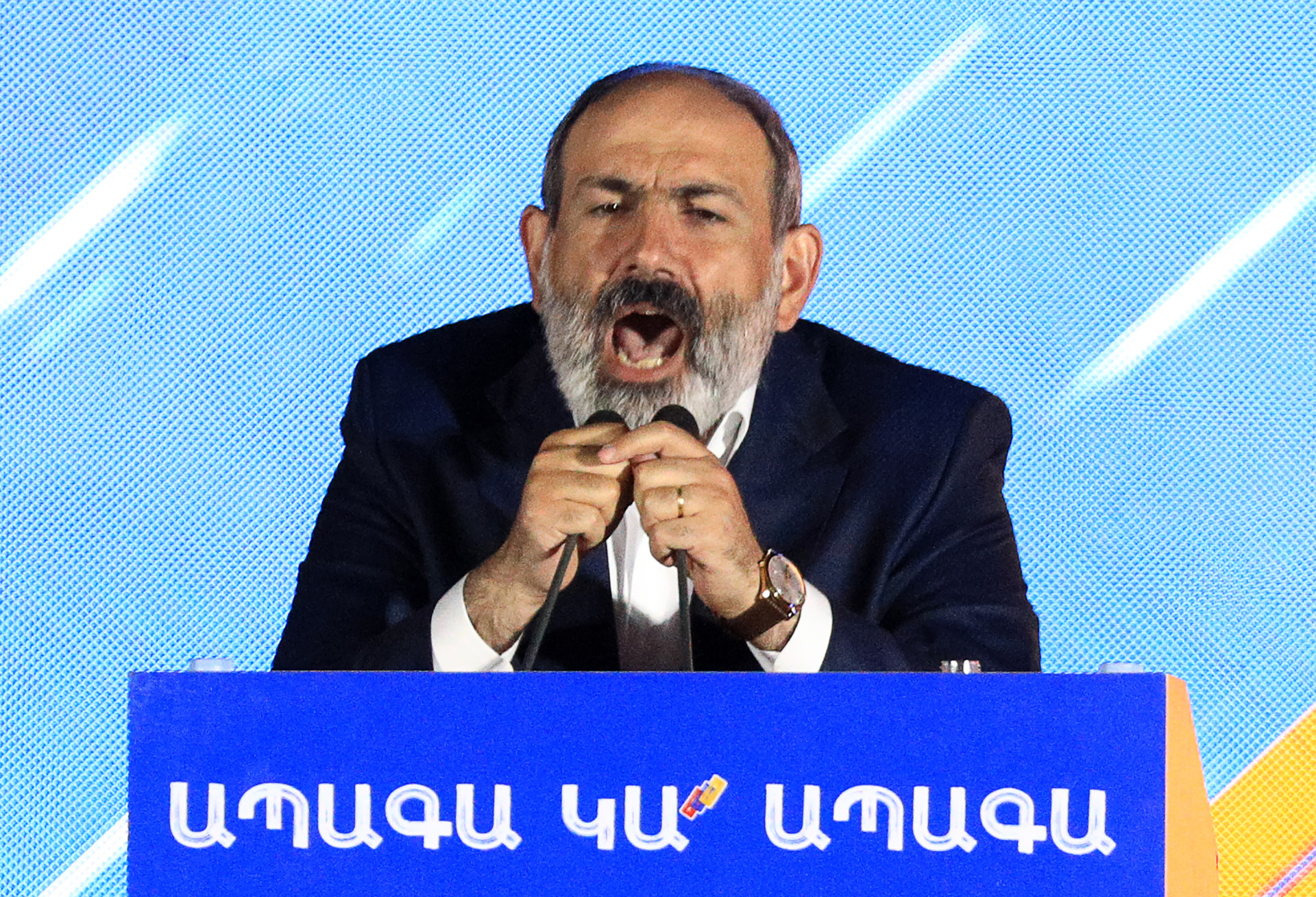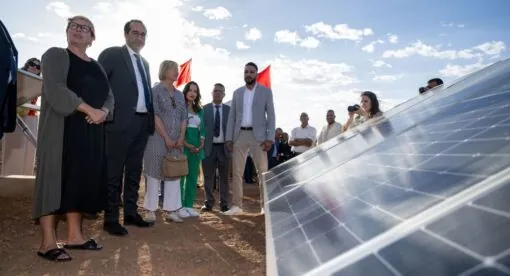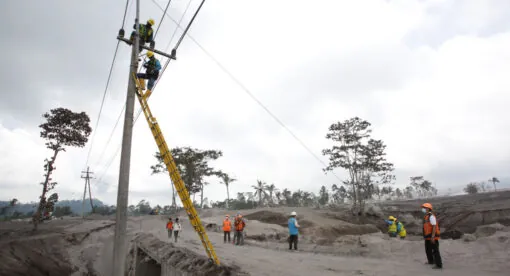Azerbaijan could use Armenia’s snap elections as an opportunity for military action, potentially disrupting or delegitimizing the vote in the vulnerable country. This gives the United States a chance to engage in preventive diplomacy.
Armenia’s snap elections, scheduled for June 20, will be a crucial test not only for the landlocked republic’s fragile democracy but also for a tenuous truce with neighboring gas-rich Azerbaijan and regional security at large.
At the top of the agenda is security, following the devastating Armenian-Azerbaijani war over the adjacent ethnic Armenian enclave of Nagorno-Karabakh in 2020. Azerbaijan’s Turkey-backed assault was halted only by a Moscow-brokered cease-fire agreement.
In recent weeks, Azerbaijan has ratcheted up rhetoric and military aggression toward Armenia, launching several incursions into its neighbor’s territory, including seizing a key lake, taking six soldiers prisoner, and fatally shooting another serviceman, against the backdrop of the stated goal of creating a corridor to Turkey that would slice through Armenia proper. “We are implementing the Zangezur Corridor whether Armenia wants it or not,” President Ilham Aliyev told Azerbaijani state media on April 20, noting that if Armenia refused, the corridor would be accomplished “by force.”
No regional power is more sensitive to this scenario than Iran. After watching uncomfortably from the sidelines as Azerbaijan entered Nagorno-Karabakh with pivotal Turkish military support last year, and seeing roughly two-thirds of its northern border pass from Armenian to Azerbaijani control, Tehran is now on high alert over the prospect of a Turkish corridor severing its land link with Armenia proper.

Turkey supports such a corridor; a land bridge through Armenia would provide a direct link to the Turkic states of Central Asia and beyond. For Azerbaijan, besides offering a direct link to its exclave of Nakhchivan, and therefore Turkey, it would remove any dependence on Iran for the movement of western-bound goods.
Russian President Vladimir Putin supports the resumption of regional connectivity and made the restoration of all economic and transport links, namely roads and railways, through the former Soviet states a key plank of the Nov. 10 Nagorno-Karabakh cease-fire agreement. Yet Baku’s imposition of a ticking clock, compounded by claims to Yerevan itself, has added a pronounced angle of hostility to the project.
In Armenia, there is rife speculation that Aliyev is looking to extract maximum gains from a weakened Armenian Acting Prime Minister Nikol Pashinyan before his potential ouster to a more seasoned replacement; others see Baku as steadily creating new facts on the ground in an atmosphere of impunity. The U.S. and the European Union, which have encouraged Armenia’s democratization and anti-corruption efforts following the Velvet Revolution of 2018 and which, via the OSCE Minsk Group, were officially committed to negotiating a diplomatic solution for Nagorno-Karabakh, did nothing tangible to impede Azerbaijan during its mid-pandemic assault on the unrecognized republic. The United States went so far as to fete Azerbaijan in the wake of the war for the inauguration of its Armenia-skirting Southern Gas Corridor and later give the green light for renewed military aid to Baku. UNESCO, which has received millions of dollars in Azerbaijani funding, has similarly declined to raise the alarm over the deliberate destruction of Armenian heritage during and after the war. For Baku, it appears clear that its “influence machine” has paid dividends and that the West no longer needs to be taken into consideration when considering military operations.
The threat of a renewed Turkish-backed war and possibility of West Bank-esque corridors slicing through Armenia has raised the specter of a damaging new wave of emigration. Pashinyan, instead of being able to discuss the post-war benefits of restored regional trade links as outlined in the cease-fire agreement, is fighting for his political life, with voter nostalgia growing for his strongman foil of the ancien regime, former President Robert Kocharyan.
The Biden administration can and should support Armenian democracy during this crucial period, not only by supporting the democratic process and urging all parties to respect the results but above all by ensuring it is not derailed by a new regional conflagration. As President Joe Biden and NATO look to contain Russia, they should seek to bolster the sovereignty of small states in the fragile buffer zone and dissuade regional powers from transforming them into battlegrounds. The United States possesses the legitimacy, as Minsk Group co-chair and as a longstanding partner to both Armenia and Azerbaijan, to engage in needed preventive diplomacy.
Support Slipping for Pashinyan
On the eve of Armenian parliamentary elections, the incumbent Pashinyan is seeing his support base dilute amid unease surrounding the future of Nagorno-Karabakh and Armenia itself. Initially scheduled for 2023, the elections were moved up following the Nagorno-Karabakh war and its messy aftermath. The territorial defeat has highlighted Armenia’s failure to update its armed forces and secure Kosovo-level recognition for the isolated Nagorno-Karabakh Republic, in stark contrast to Azerbaijan’s technological advantage and diplomatic backing.
Pashinyan is also in the middle of a hostage crisis, with an estimated 200 military personnel and civilians held captive in Azerbaijan. On June 12, Pashinyan agreed to hand over maps detailing the locations of 97,000 landmines planted in the Aghdam district of Azerbaijan in exchange for just 15 POWs; U.S. Secretary of State Antony Blinken signaled that Washington had brokered the deal with facilitation from Georgia. However, this is hardly a diplomatic victory: Pashinyan is now seen by detractors as willing to give up state secrets to score political points, while the U.S. is seen by Armenians as approving hostage diplomacy in Eurasia.
Pashinyan, just three years removed from his rise to power after mass anti-corruption protests known as the Velvet Revolution, is a deeply controversial figure, both associated with military defeat and viewed by critics as a political novice unable to stand up for Armenia’s interests or to recruit and retain competent civilian or military leaders. His supporters blame his predecessors for decades of corruption and failure to adapt or negotiate a durable settlement with Azerbaijan, while his critics say he must take responsibility for the miscalculations that have put Armenian statehood itself in question.
Pashinyan’s most viable competitor by far is former President Kocharyan, whose Armenia Alliance coalition has been steadily gaining on the prime minister’s Civil Contract bloc and, according to the latest local polls, this week barely pulled ahead of the incumbent. Viewed by detractors as a brutal authoritarian and enabler to a corrupt post-Soviet oligarchy, Kocharyan is seen by supporters as a tough, capable leader whose record of diplomacy with Aliyev’s late father and predecessor, Heydar, and close personal ties with Putin would restore Armenia to a position of respect in negotiations.

Should Pashinyan fail to secure a healthy majority, Armenia’s electoral system could see him lose the premiership to a coalition of rivals. Alternative candidates, including former presidents and Pashinyan allies who also oppose Kocharyan’s return, meanwhile have faced an uphill battle in securing airtime or being perceived as viable.
The impending contest between two highly polarizing figures threatens a contested result and ensuing unrest. Pashinyan has reserved Yerevan’s central Republic Square for the four consecutive days following the election, raising the specter for a “stop the steal”-style rally that could mar the legitimacy of the process and leave Armenia in a prolonged state of political chaos. Domestic unrest in Armenia risks being seized upon by Aliyev and his Turkish allies as a crucial window for a new military operation into Armenia, a worst-case scenario that would severely test the Russian peacekeeping mission and threaten the entrance of Iran.
A Month of Tension
As Azerbaijan continues to encroach, Armenia’s military, having failed to adequately fortify newly exposed and shifted borders in the six months since the November 2020 truce, appears to be exercising maximum restraint, even at the cost of retreats on their own soil, for fear of a new all-out war. An embattled Armenian government has instead looked to its international allies for support, namely Minsk Group co-chairs the United States, France, and Russia – the latter being Armenia’s traditional security guarantor.

Baku’s shifting of the conflict to Armenia proper has notably triggered the first major test of the Moscow-anchored Collective Security Treaty Organization (CSTO), of which Yerevan is a member and Baku is not. Russia, seeking to keep Azerbaijan in its orbit, has refrained from harsh words over its moves, but it has bolstered its military presence in southern Armenia at the request of Yerevan in line with treaty obligations. Russia also has a longstanding military base in the northwestern city of Gyumri, bordering Turkey.
Washington and Paris offered stern condemnations of the Azerbaijani incursions and prisoner-taking, calling on Azerbaijani forces to withdraw. But those words are to date not reflected in policy. Rather than censure Baku for abandoning diplomacy and launching a mid-pandemic war plagued by atrocities – including filmed beheadings, white phosphorus use in the forests, and the deployment of Syrian mercenaries – Blinken on May 4 waived Section 907 of the U.S. Freedom Support Act to pave the way for fresh military support to Azerbaijan. The decision eroded the goodwill gained from Biden’s recognition of the Armenian Genocide the week prior and sent the message that Washington condones an atmosphere of increasing impunity and spurning of international law in the Eurasian sphere.
As Armenians prepare to go to the polls on Sunday, hundreds of Azerbaijani troops are estimated to remain on Armenian soil. The prospect that Azerbaijan, backed by Turkey, could launch a new operation on the eve of the election or during a contested aftermath risks sabotaging Armenia’s democratic process and scuttling the formation of a government in Yerevan with a clear mandate. What would remain is an acting prime minister with a diluted support base and little room to maneuver, viewed by detractors as incompetent at best and a pliant tool of Armenia’s friends and foes at worst.
At present, Russian forces appear to be the only factor standing in the way of Azerbaijan’s potential appetite for a new military gamble. Yet it is also an open question whether Moscow would ultimately oppose such a push or turn it to its advantage, especially given that the November truce provides for Russian control of proposed trade links.
This is precisely the reason that small, fragile democracies like Armenia seek to balance their alliances between the West and Eurasia. Should Moscow perceive that Washington and Paris have totally disengaged from Yerevan, leaving it to its fate, Armenia could be reduced to a bargaining chip, with Stepanakert or a Russian-policed Turkish corridor at risk of becoming the future trades for concessions in Syria, Ukraine, and any other theater of territorial negotiation between Ankara and Moscow.
Western diplomats and the U.N. country chief in Armenia have notably been making their presence felt with visits to the southern provinces in recent weeks, but it is unlikely that such cosmetic displays would deter Baku or its ally Ankara from carving out a pledged corridor through Armenia.
Possible Iranian Intervention
Iran is on high alert over the developments in Armenia, wary of Azerbaijan’s demands for territorial concessions near the northern border with Georgia and southern border with Iran.
On May 17, in the wake of the Azerbaijani military takeover of a key Armenian water source, Black Lake and following a fresh threat by Aliyev to seize his desired pan-Turkic corridor by force if necessary, a key Iranian figure spoke out. Mojtaba Zonnour, Chairman of the National Security and Foreign Policy Committee of the Iranian parliament, highlighted the Azerbaijani moves as a direct threat to Iranian interests. “If part of the territory of Armenia is to be taken and our border conditions change, that is, to have a new neighbor, it is not acceptable for us. The existing borders must be completely protected and the shared border of the Islamic Republic of Iran with Armenia must be maintained,” said the conservative heavyweight.
In the view of Iran, a widening border with Azerbaijan means a widening border with Israel. Azerbaijan is understood to allow Israel to use its territory as a staging ground for strikes on Iranian nuclear infrastructure and the creation of key listening posts. Israel has reciprocated, providing Azerbaijan with pivotal and unwavering military support during its war for Karabakh in the form of drones, cluster munitions, and diplomatic backing. The creation of a Turkish corridor slicing through southern Armenia would mean a corrosion of Armenian sovereignty over its southern provinces and effectively sever the Armenia-Iran border.
The increasing demands by Baku for strategic villages near Armenia’s northern border with Georgia are similarly alarming to Tehran, as this would force Iranian trucks to travel through Azerbaijan en route to the Black Sea.

A new policy paper published by the Iranian Parliament’s in-house research center warns that Turkey is working toward a land bridge to Central Asia that would “turn the Iranian-Armenia border into a barrier.” It advises the government to immediately repair and revive transportation links through Armenia and facilitate trade with Azerbaijan.
On May 25, Iran’s Customs Administration chief hosted his Arminian counterpart in Tehran to discuss the “modernization of the border checkpoint of Meghri”, publicly signaling that the two countries were working to secure their mutual land border.
While “maximum pressure” advocates and establishment Iran hawks alike in Washington might be tempted to view any hemming in of Iran by an Israel-aligned authoritarian dynasty as a positive, the entry of an additional major regional power into the conflict would be a further detriment to an already complex U.S. policy of support for regional normalization and liberalized trade.
Diplomacy to Date
The United States, Russia, and France are the designated mediators of the Nagorno-Karabakh dispute, entrusted by Azerbaijan and Armenia in the aftermath of the First Karabakh War to negotiate a durable solution to a situation in which the U.N. principle of the right to self-determination is directly pitted against internationally recognized Soviet-era borders.
Azerbaijan, in seizing control of most of Nagorno-Karabakh, including the contested city known to Azerbaijanis as Shusha and Armenians as Shushi, has reversed what it considered a humiliating defeat to the Armenians in the 1990s. Yet in agreeing to a Russian-brokered truce and the entrance of Russian troops to the region, instead of attempting to overrun the entire enclave with the help of Turkey, Baku – and certainly Ankara – showed a preference for working with Moscow to craft the future of the region rather than working against it.
Post-war, President Aliyev appears eager to cut the OSCE out of regional processes, telling its co-chairs in December Azerbaijan had resolved the conflict through force.
Armenia, while cognizant it will need to tighten security arrangements with Russia even further – a plank of almost every election candidate’s platform, has at the same time worked to keep the U.S., EU states, and OSCE in the mix and appears opposed to being subsumed by regional powers, a goal Washington can and should support.
Preventive Diplomacy
There are several key steps the U.S. can take to recalibrate from a destabilizing to a balanced approach and, in doing so, avert new aggression and conflict in the South Caucasus, support the sovereignty and democracy of small states, and send a message against the growing trend of authoritarianism in Eurasia and the implementation of policy goals by force.
1. Make clear to Baku that military aggression against Armenia will not be tolerated, especially amid what could be a drawn-out and contested electoral process. The State Department should immediately rescind its waiver of Section 907 of the Freedom Support Act, back parity, and make military aid to Azerbaijan contingent on neighborly behavior. At present, Azerbaijan enjoys mammoth military supremacy over its neighbor, which encourages rather than dissuades it from embarking on a new war. NATO ally Turkey, which under President Recep Tayyip Erdoğan’s leadership has become a party to the conflict – in departure from its previous neutrality – must also be engaged. The U.S. also should reach out to the new government in Israel to make clear its opposition to military support for a new Azerbaijani assault, which could destabilize the region further by drawing in Iran.
2. Engage with Minsk Group co-chair Russia to promote maximum transparency over the contents of the November truce agreement. Baku asserts that it has been promised an exclusive corridor through Armenia, while Yerevan maintains that the language of the deal sees only a guaranteed restoration of trade links. Washington can play a crucial role in combating disinformation and promoting trust between the two rivals – and between the Armenian public and its own government – by working with Russia via the Minsk Group to make the terms clear. If the Minsk Group can state that the deal calls for a sovereign Armenia to allow safe passage for trade by its neighbors, that will not only bolster proponents for free trade and open borders but also reassure Iran and temper the current state of alert.
3. Direct the U.S. embassy in Armenia to launch a sustained engagement campaign, highlighting Washington’s commitment to Armenia’s sovereignty and the release of POWs based on the provisions of the November truce, not hostage diplomacy. Lawyers for the POWs at the European Court of Human Rights say they possess evidence that Azerbaijan has already executed 19 of them, including four women, while dozens of others are now being put through the same courts Baku has used to prosecute activists. Once they are sentenced, it will be an even larger issue to secure their freedom. The U.S. Ambassador to Armenia, Lynne Tracey, has exercised a notable lack of engagement to date, appearing silent for the duration of the Karabakh war and refraining from speaking out over the Azerbaijani incursions into Armenia proper. The ambassador’s conduct, which stands in sharp contrast to her highly engaged peers from the EU, has been a source of consternation for Armenians in Armenia and the U.S. diaspora. Appointing a new, enthusiastic ambassador would offer a fresh start.
The Biden administration appears cognizant of the need and benefits of renewed engagement in the South Caucasus, embodied in the latest visit of Deputy Assistant Secretary of State for European and Eurasian Affairs Philip Reeker and efforts toward a breakthrough on the hostage front. His visit was a welcome development, and there should be sustained follow-up.
Blinken must turn the page on the harmful policies of previous administrations toward Armenia, which have coddled and armed Azerbaijan and sent signals to it and its chief backer Turkey that conflicts with neighbors may be resolved through force. In the wake of the Karabakh war, Ukraine purchased a fleet of Turkish drones, boding new, destabilizing conflict in the region. Armenia, located at the fault line between Iran, Turkey, and Russia, is prone by virtue of its geography to destabilizing interference. To avert a new conflict and achieve Biden’s stated goal of a “stable, predictable” relationship with Russia, time and engagement in the South Caucasus are of the essence.
Alison Tahmizian Meuse is a veteran Middle East journalist, reporting for AFP, NPR, and the Asia Times for the past decade. She is a newly appointed senior fellow at the Regional Studies Center in Yerevan and a strategic advisor at DeepStrat consultancy out of New Delhi, where her research will focus on Armenia’s evolving global alliances, relations to the Arab world, and strategies for navigating the regional power negotiation between Russia, Turkey and Iran. She tweets at @ AliTahmizian.
The views expressed in this article are those of the author and not an official policy or position of the Newlines Institute.






